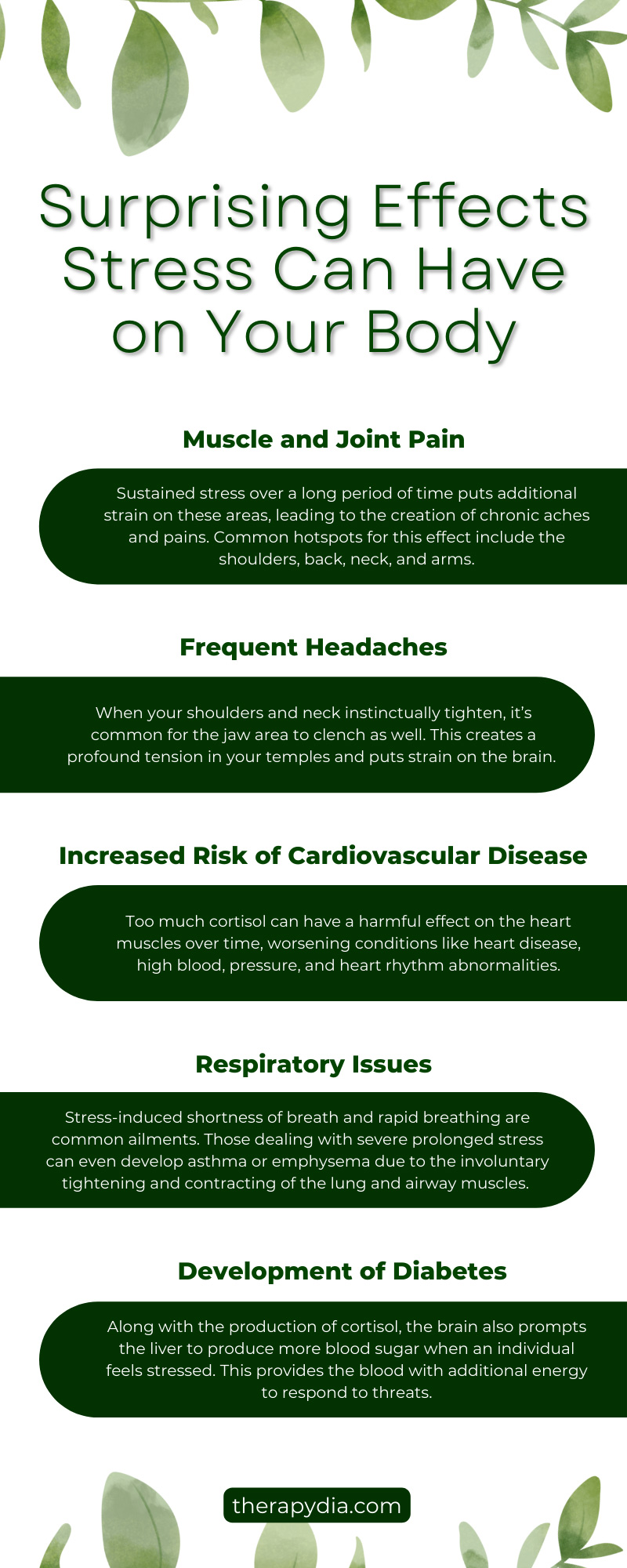
8 Surprising Effects Stress Can Have on Your Body
Between work, family, and a slew of other responsibilities, stress is a common part of the average person’s daily life. While some amount of stress can give us the drive to meet our goals and achieve success, too much can pave the way for a wide variety of physical and mental issues. That’s why it’s vital that you can recognize the importance of controlling your stress early on and what you’re exactly setting out to prevent. These are some of the surprising effects stress can have on your body and how you can help manage stress in the future.
Muscle and Joint Pain
One of the first indicators that you’re suffering from the effects of stress is that you’ve developed considerable muscle or joint discomfort. When we feel stressed, our bodies immediately trigger our fight or flight response. Muscles tighten, ligaments stiffen, and your heart rate accelerates until the perceived threat goes away. So, sustained stress over a long period of time puts additional strain on these areas, leading to the creation of chronic aches and pains. Common hotspots for this effect include the shoulders, back, neck, and arms.
Frequent Headaches
Just like constant physical tension can result in muscle pain, it can also cause you to develop headaches. When your shoulders and neck instinctually tighten, it’s common for the jaw area to clench as well. This creates a profound tension in your temples and puts strain on the brain. As a result, those dealing with regular stress have the tendency to experience frequent headaches too. These symptoms can sap you of your energy and make it hard to do even the most mundane of daily tasks. Because of this, finding ways to ease your stress can go a long way in improving your day-to-day comfort.
Increased Risk of Cardiovascular Disease
Long-term stress can pose a threat to your overall physical health too. As previously mentioned, stress causes the heart rate to speed up, transporting more oxygen to various areas of the body. It does this by triggering the brain to release a hormone called cortisol. Too much cortisol can have a harmful effect on the heart muscles over time, worsening conditions like heart disease, high blood, pressure, and heart rhythm abnormalities. Therefore, your ability to manage your stress is directly linked to preventing some serious health conditions later in life.
Respiratory Issues
The same effect can occur with a person’s lungs and respiratory tract. Just like cortisol can deteriorate your heart muscles with prolonged exposure, it can also greatly affect your lungs. Stress-induced shortness of breath and rapid breathing are common ailments. Those dealing with severe prolonged stress can even develop asthma or emphysema due to the involuntary tightening and contracting of the lung and airway muscles. Proper breathing exercises can help release some of the tension in these areas and open up your airways. However, you’ll require additional treatment after developing a chronic respiratory condition.
Development of Diabetes
Believe it or not, your stress levels can even contribute to diabetes if you aren’t careful. Along with the production of cortisol, the brain also prompts the liver to produce more blood sugar when an individual feels stressed. This provides the blood with additional energy to respond to threats. However, some individuals can’t reabsorb all the excess sugar once their stress dissipates. This increases their chances of developing Type 2 diabetes and triggering subsequent thyroid and weight gain issues. So, if you know you’re at risk for diabetes, you’ll want to monitor your blood sugar carefully during periods of stress.
Poor Digestion
Have you ever experienced gastrointestinal distress during particularly high-tension moments? If so, you’re not alone. Stress can impact the digestive system, leading to acute stomach pain, nausea, and vomiting. Many describe this sensation as butterflies fluttering in the stomach, and it’s often followed by more severe ailments that indicate physical abnormalities. In long-term cases, individuals may experience constipation. Those already dealing with irritable bowel syndrome (IBS) may also experience a worsening of their overall symptoms.
Lowered Immune System
Another surprising effect stress can have on your body is the lowering of your core immune system. It’s well-known that stress sends the body into overdrive to best respond to threats. However, in doing so, it takes essential protection away from your central immune system. This leaves you more susceptible to catching common viruses, colds, and the flu. It also increases your odds of developing infections following surface wounds and abrasions. Even minor cuts can take longer to heal, and individuals may experience more complications after the fact.
Severe Depression
Shockingly enough, stress can even contribute to depression. Though you might not initially see the connection, depression symptoms occur due to chemical imbalances in the brain. With a myriad of blocking hormones at work, such as cortisol and adrenaline, stress can inhibit the brain’s ability to produce serotonin. This can cause an individual to not only sustain a heightened state, but it can also prevent them from experiencing happiness. This effect can eventually take an emotional toll and make it more difficult to push through it, resulting in future struggles with mental health. For this reason, managing your stress is both a way to maintain your physical health and mental well-being.
If you’re looking for a healthy way to help you manage your stress and improve your health at the same time, physical therapy could be just what you need. Not only do these sessions put you in contact with qualified professionals to talk about your symptoms, but they also provide resources for releasing pent up stress. These exercise regimens can teach you coping skills to take control of stress while allowing you to move your body and strengthen your muscles.
As an experienced Ballard physical therapy clinic, we at Therapydia work hard to get to the bottom of your discomfort and develop plans to ease your symptoms. Whether you simply want to alleviate stress to avoid the above conditions or want to invest in your long-term recovery and well-being, we’re the perfect resource. We care about your needs and will go above and beyond to ensure you get everything possible out of each session with our licensed physical therapists.
